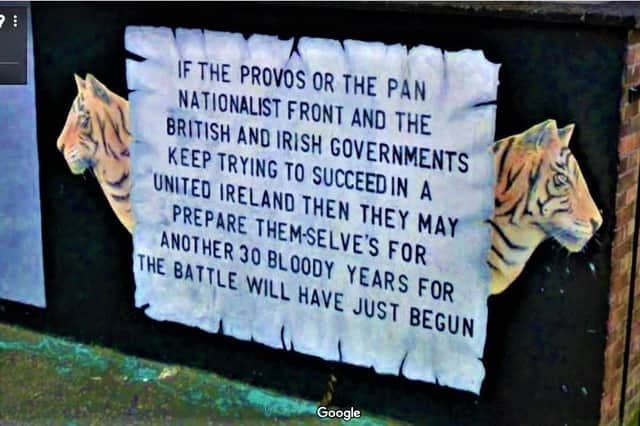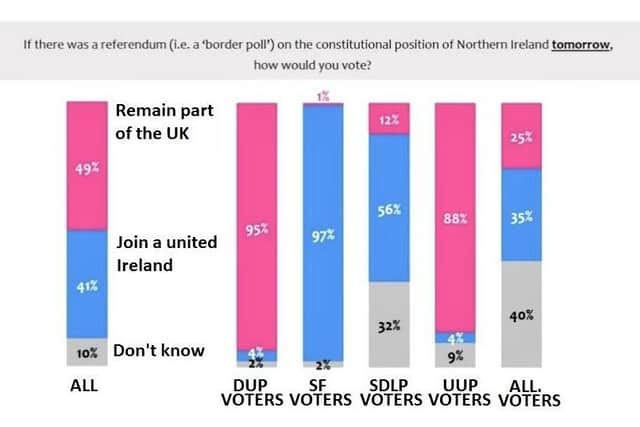Knife-edge Irish unity survey from Tory peer stands in contrast to much more pro-Union polls


But this poll – run by Lord Ashcroft – paints quite a different picture of pro-unity sentiment than other recent surveys.
In addition there is little detail on how respondents were selected, or whether local pollsters like LucidTalk helped to compile the data (see below: ‘HOW WERE ASHCROFT RESPONDENTS CHOSEN – AND WHO DID THE FIELDWORK?)
Advertisement
Hide AdAdvertisement
Hide AdLord Ashcroft Polls is a public opinion outfit run by the eponymous businessman, who is a former deputy chairman of the Conservative Party and is based in the central American nation of Belize.


In recent years his polls have shown a relatively high level of support for Irish unity.
PEER AND LUCIDTALK PUT PRO-IRISH UNITY SUPPORT AT 41%-PLUS:
Lord Ashcroft’s latest findings show that, if there was a border poll tomorrow, the results would be:
> 49% for the Union
> 41% for Irish unity
> And 10% unsure
(When you exclude those respondents who are unsure, this makes 54% for the Union against 46% for Irish unity.)
Advertisement
Hide AdAdvertisement
Hide AdAn earlier poll from Lord Ashcroft, carried out in 2018, had shown 49% of respondents would vote to stay in the UK if a border poll were held tomorrow, 44% would vote to leave, and 7% said they did not know.
The results of these Ashcroft polls are relatively close to results obtained by Belfast polling firm LucidTalk.
For example in January of this year, LucidTalk ran a poll which found:
> 47% for the Union
> 42% for Irish unity,
> And 11% were unsure or would spoil their vote.
Previous survey work by LucidTalk has thrown up similar results.
Advertisement
Hide AdAdvertisement
Hide AdAnd whilst such results are often uncritically reported by the media across the British Isles, there is a strong body of evidence that suggests support for Irish unity could be much lower than the Ashcroft and LucidTalk polls suggest.
...BUT UNIVERSITY-RUN POLLS GIVE IRISH UNITY SUPPORT AT ONLY AROUND 30%:
Arguably the most significant of these is the Life and Times Survey.
It has been running regularly since the 1990s, and was created jointly by the Province’s two universities.
Advertisement
Hide AdAdvertisement
Hide AdUnlike Ashcroft and LucidTalk polls, the Life and Times surveys are based on face-to-face result gathering and they show far lower support for Irish reunification.
Looking back through the decades, the Life and Times surveys have found support for Irish unity ranging from 30% (2006) all the way down to 14% (2015).
Most recently in 2020, the Life and Times survey asked people the following:
Suppose there was a referendum tomorrow on the future of Northern Ireland, and you were asked to vote whether Northern Ireland should unify with the Republic of Ireland. Would you vote ‘yes’ to unify with the Republic or ‘no’?
The results were:
> United Ireland: 30%
> No united Ireland: 53%
> Would not vote/don’t know, etc: 16%.
Advertisement
Hide AdAdvertisement
Hide AdAdded to this is an online study published just last month by the University of Liverpool, which asked:
If there was a border poll tomorrow, would you vote for Northern Ireland to stay as part of the United Kingdom or for a United Ireland?
The results were:
> 59% for the Union
> 30% for a united Ireland
> And 12% do not know or would not vote.
As well as asking a general question about Irish unity, the new Ashcroft poll also contains some striking findings about party politics.
For example, it found that only 56% of SDLP voters would actually back a united Ireland if there was a vote tomorrow.
Advertisement
Hide AdAdvertisement
Hide AdIt also found that some 4% of DUP voters would back a united Ireland.
It also asked respondents about Brexit – specifically, whether leaving the EU had been the right thing to do for Northern Ireland.
In all, 66% of unionist respondents said yes, while 30% said no.
This is a far more divided result than when the question was asked of nationalists/republicans, 95% of whom said it was the wrong decision.
(Note: numbers in this report are rounded)
Advertisement
Hide AdAdvertisement
Hide AdHOW WERE ASHCROFT RESPONDENTS CHOSEN – AND WHO DID THE FIELDWORK?:
Key to all public polls is who carried them out, and how.
All that the new Ashcroft poll appears to offer on this subject is a two-line “methodological note”, saying 3,301 adults in Northern Ireland were interviewed online between November 15–18.
Eight focus groups were held in Lisburn, Strabane, Enniskillen and Carrick, too.
When he brought out his 2018 poll, Lord Ashcroft had refused to say who exactly carried out the fieldwork.
Advertisement
Hide AdAdvertisement
Hide AdAsked about who did the fieldwork for his new poll, no response had been received at time of writing last night.
Belfast firm LucidTalk – one of the only companies which does regular political polling in the Province – was asked if it had carried out the fieldwork for Lord Ashcroft.
Its boss Bill White responded: “LucidTalk do not comment on the professional activities, or structure of projects, carried out by other polling and market research organisations.”
LucidTalk has been grilled a number of times by the News Letter and Stephen Nolan about the nature of its polling work – particularly the fact that its polls are all based on a pre-set pool of online volunteers, as opposed to a totally random selection of people.
More on this topic from this reporter:
Advertisement
Hide AdAdvertisement
Hide AdClick here: Northern Ireland polling firm LucidTalk has wrongly claimed it is member of UK professional research body
——— ———
A message from the Editor:
Thank you for reading this story on our website. While I have your attention, I also have an important request to make of you.
Advertisement
Hide AdAdvertisement
Hide AdWith the coronavirus lockdowns having had a major impact on many of our advertisers — and consequently the revenue we receive — we are more reliant than ever on you taking out a digital subscription.
Subscribe to newsletter.co.uk and enjoy unlimited access to the best Northern Ireland and UK news and information online and on our app. With a digital subscription, you can read more than 5 articles, see fewer ads, enjoy faster load times, and get access to exclusive newsletters and content.
Visit
https://www.newsletter.co.uk/subscriptionsnow to sign up.
Our journalism costs money and we rely on advertising, print and digital revenues to help to support them. By supporting us, we are able to support you in providing trusted, fact-checked content for this website.
Ben Lowry, Editor